Pouya Idani and Anahita Zahedifar top Zone 3.1 Zonals in Iraq
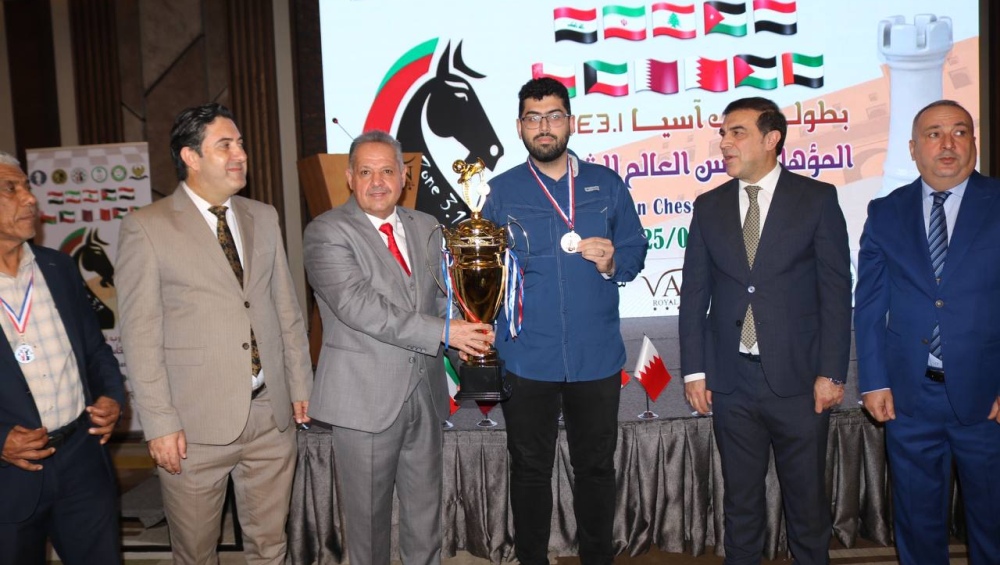
Iraqi Chess Federation president Dhafer Abdul Ameer Madhloom awards the champion’s trophy to Idani GM Pouya Idani (pictured above) and WFM Anahita Zahedifar, both representing Iran, emerged as the winners of the Zone 3.1 Men’s and Women’s Zonals held from April 8–15, 2025, in Erbil, Iraq. Asian Chess Federation General Secretary Hisham Al Taher makes the ceremonial opening moves in the Zone 3.1 Zonal Chess Championship in Erbil, Iraq assisted by Iraqi Chess Federation president Dhafer Abdul Ameer Madhloom and first Vice president of Iraq Olypmpic Committee Abdolsalam Khalaf The open event, a 9-round Swiss tournament featuring 46 players from 10 federations, turned into a close race between Pouya Idani and Bardiya Daneshvar. The two Iranian Grandmasters, who entered as the top two seeds, lived up to expectations by tying for first place with 8.5 points each. Idani clinched the title thanks to superior tiebreaks based on the average rating of his opponents. Both players qualified for the FIDE World Cup 2025. Final standings Open The women’s section saw twenty participants from six countries: Bahrain, Iran, Iraq, Lebanon, Palestine, and host nation Iraq. Anahita Zahedifar (pictured above) secured victory with a strong 7.5/9 score, finishing half a point ahead of fellow Iranians Tannaz Azali and Anousha Mahdian, who shared second place. With this result, Zahedifar qualifies for the FIDE Women’s World Cup 2025. Final standings Women Officials in the Zone 3.1 Men’s and Women’s Zonals led by Iraqi Chess Federation president Dhafer Abdul Ameer Madhloom (seated center) and, next, Chief Arbiter Mehrdad Pahlevanzadeh of Iran Photos: asianchess.com/
Fighting chess in WGP India – Zhu Jiner leads after three rounds
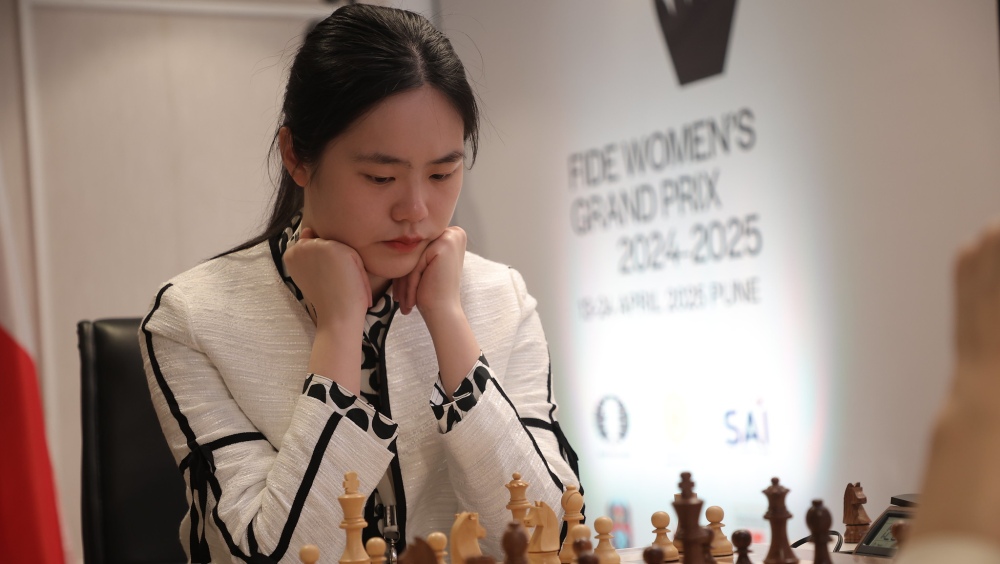
Nine decisive outcomes in fifteen games is a testament to the fighting spirit on display in the Women’s Grand Prix, here in the Amanora The Fern Hotel complex in Pune. Spectators that attended the playing venue this afternoon to watch the games and catch a photo with their favourite player were in for a treat: no fewer than three games ended decisively. The ceremonial first moves were performed by Dr. Praniti Tilak, Trustee of the Tilak Maharashtra Vidyapeeth University, who opened the game for Nurgyul Salimova, and Mr. Ashwin Trimal, Vice President of the Pune District Chess Association. The owner of the Amanora Group, Mr. Aniruddha Deshpande, also took part. With today’s results, one of tomorrow’s Round 4 matchups should be especially exciting. While all the games have their charm, Shuvalova vs. Humpy will be the one to follow closely. Polina will be eager exert pressure with the white pieces and aim for her second victory, while Humpy will keep pushing to accumulate points in the event. Let’s take a closer look at this afternoon’s games. Alina Kashlinskaya 0 – 1 Munguntuul Batkhuyag The first game to finish ended in spectacular style. Mongolia’s number one female player Munguntuul Batkhuyag took down Poland’s Alina Kashlinskaya in a complicated, opposite-side castled attacking game. As Munguntuul explained in her post-game interview, she tried out a new opening, which neither of the two had played before, including a pawn sacrifice to open up some files against her opponent’s king. Alina didn’t react in the best way and soon her king was in trouble, besieged by her opponent’s heavy pieces. In this position, Munguntuul went in for the kill. She swapped off both White’s knights with 30…Bxf3 31.gxf3 Bxd4 32.exd4 and then finished off with 32….Rxb3+ 33.Kc2 and the fantastic 33…Qc7+! 34.Kxb3 Rb8! after which Kashlinskaya resigned facing checkmate along the a-file. After the game, Munguntuul went through her thought process with Michael Rahal, FIDE Press Officer, noting that “Maybe the late call to play here hasn’t allowed Alina to prepare properly.” https://www.youtube.com/watch?v=zP0kgqXAmIw Vaishali Rameshbabu 0.5 – 0.5 Polina Shuvalova Against Shuvalova’s Two Knights Defence, Vaishali went for a line that is theoretically considered harmless and even slightly worse for White. However, engine opening analysis has advanced a lot and we keep getting new information. Perhaps still affected by her defeat yesterday, the Indian player did not want to take any risks and, even though Vaishali achieved a slight advantage in terms of pawn structure, she never had any real chances of winning. At the end, Shuvalova simplified into a rook ending, with three pawns against two on the same side of the board, which was declared a draw on move sixty-three. Both players hit an unbelievable 99% accuracy performance: a high-level game! Humpy Koneru 1 – 0 Divya Deshmukh Having started the tournament with two solid draws with Black, the current Rapid World Champion was keen to display her strength with the white pieces. Her opponent, Divya, leading the event, had more time to spend on her preparation, after defeating Vaishali yesterday in the opening. In a fashionable English opening, Humpy tried out an interesting idea based on a quick h4-h5. Surprised, Divya spent twelve minutes on her reply and soon fell into time trouble. As she mentioned after the game, Humpy gained the upper hand due to her opponent’s weakened king, to the point that the exchange of queens was the best option for Divya to hold. But then Humpy brought out her best endgame technique, and displayed the full power of the bishop pair in the late middlegame and endgame, weaving a mating net and finishing the game in style. Check out her post-game interview on Youtube in which she outlines the road to victory. https://www.youtube.com/watch?v=nTE41xLu-UQ Nurgyul Salimova 0 – 1 Harika Dronavalli While I was interviewing Humpy, I lost track of the other interesting game of the day, in which Harika was pushing in the Catalan with Black. And, in fact, the game was decided at the same time. As fortune would have it, Harika was interviewed on the live stream and gave her thoughts on the full game. You can check it out on the following link, starting on 5h 38 minutes. Salimova misplayed the opening – 16.Qxc4 was equal while 16.Rc1 drops a pawn and then 19.e4 instead of 19.Bxc5 was much better – and suddenly Harika had some clear chances to get out of the hole and score her first win. The Indian certainly could have finished the job sooner – the engine suggests 47…Qe1 with a decisive advantage instead of 47…Qd4 – but she kept her cool and eventually prevailed in the ending. Zhu Jiner 0.5 – 0.5 Salome Melia The final game to finish was also the most solid of all of them. With the draw, Zhu Jiner maintains her lead while Salome picked up a well-deserved half point with Black. Salome essayed the Sicilian and Zhu Jiner opted for the Rossolimo Attack, very trendy these days. Around move fifteen it seemed that Zhu Jiner had lost track and Salome started to improve the placement of her pieces: things were looking very bright for her. However, Zhu Jiner kept the game going, traded some pieces and liquidated into a rook ending. The final piece was agreed on move seventy-six. Round 4 pairings The fourth round of the fifth leg in the 2024/25 Women’s Grand Prix series starts on Thursday, April 17 at 15:00 CET local time in Pune, India. Salome Melia – Divya DeshmukhPolina Shuvalova – Humpy KoneruHarika Dronavalli – Vaishali RameshbabuMunguntuul Batkhuyag – Nurgyul SalimovaZhu Jiner – Alina Kashlinskaya More information about the event, including the regulations and details of the pairings, as well as live games can be found on the official website. You can follow the games with expert commentary on FIDE’s YouTube channel. Written by IM Michael Rahal Photos: Abhilash Shinde
Abdulrahman Akintoye and Toritsemuwa Ofowino win 2025 Zone 4.2 West Africa Championship
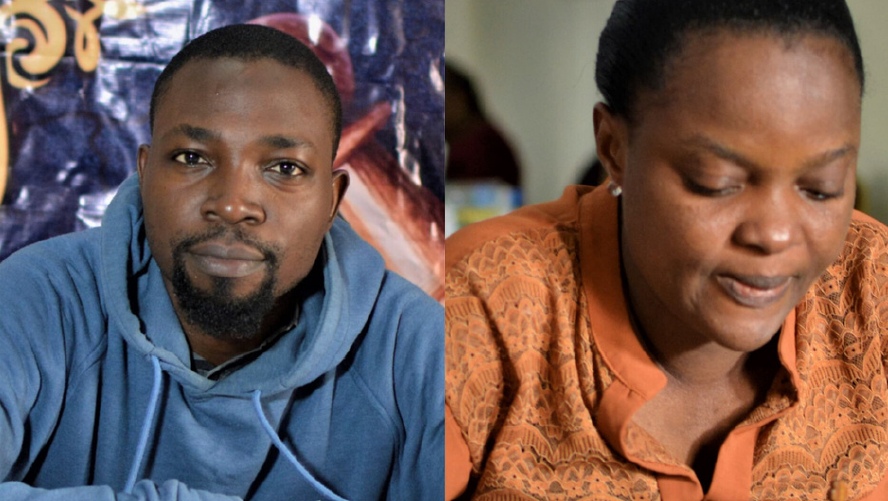
Host nations have traditionally performed well in FIDE Zonal competitions, and the 2025 Zone 4.2 West Africa Chess Championship in Lagos, Nigeria, was no exception. The host nation claimed four of the six medals on offer in this prestigious event. This year’s championship, held at the Citiheight Luxury Hotel in Ikeja, brought together 42 players from eight Zone 4.2 countries. Reigning champion Abdulrahman Akintoye rose to the occasion, winning title for the second consecutive year with an impressive 7½ points out of 9. Toritsemuwa Ofowino also displayed remarkable prowess in the women’s section, earning her second consecutive and fourth overall Zone 4.2 Championship title. Their victories ensure that Nigeria retains both Zone 4.2 Championship titles for the second year running. Additionally, both players have qualified to represent the zone at the African Chess Confederation Super Zonal Chess Championship. Abdulrahman Akintoye retains Zone 4.2 West Africa title As the defending champion, Abdulrahman was seeded second, just behind top-seeded Amarelle Ortega. He delivered an impressive performance—winning six games and drawing three—to finish with 7½ points. His key draws came against Ortega, third-seeded Denyefa Eyetonghan, and seventh-seeded Tersee Nyuima. Tennyson Olisa, the 10th seed, secured the silver medal with a strong 7-point score. The 22-year-old won six games, with his only losses coming against Abdulrahman and Odion Aikhoje. A major highlight was his victory over top seed Amarelle Ortega in Round 7. Ortega, the 2023 Zone 4.2 champion, claimed bronze with 6½ points. She scored five wins, three draws (against Toluwanimi Okemakinde, Abdulrahman Akintoye, and Denyefa Eyetonghan), and suffered one loss to Olisa. Tersee Nyuima impresses once again Tersee Nyuima, who recently made history as Nigeria’s youngest National Chess Champion, followed up with a commendable 4th-place finish. The 17-year-old won five games, drew twice with champion Abdulrahman Akintoye and Oluwadurotimi Lapite, and suffered a single defeat at the hands of Mustapha Othman. Nigeria dominates open section Nigeria underlined its strength by securing nine of the top ten positions in the open section. Odion Aikhoje, Denyefa Eyetonghan, Oluwafemi Balogun, and Oladapo Adu all finished with 5½ points, while Toluwanimi Okemakinde, Obama Onuoha, and Oluwadurotimi Lapite followed closely with five points each. Toritsemuwa Ofowino claims her second consecutive title Nigeria’s chess sensation Toritsemuwa Ofowino continued her dominance, clinching her second consecutive—and fourth overall—Zone 4.2 West Africa Championship title. The top seed lived up to expectations, scoring eight out of a possible nine points with seven wins and two draws, against WCM Emmanuela Esther Ayemou Mazan and Michelle Nwankwo in rounds four and five, respectively. Azumi Suleiman, the second seed, also impressed with a 7½-point performance, including seven wins, one draw, and one loss—to Toritsemuwa. She secured the silver medal. Ivorian prodigy Emmanuela Esther Ayemou, just 17 years old, maintained an unbeaten record throughout the competition, finishing with seven points from five wins and four draws. The sixth seed held her own against the tournament’s top competitors, drawing with Toritsemuwa, Suleiman, Michelle Nwankwo, and Bridget Michael. The African Chess Confederation Executive extends its sincere appreciation to the Nigerian government, the Minister of Sports Development, the National Sports Commission of Nigeria, and the Nigeria Chess Federation for successfully hosting this year’s edition of the Africa Zone 4.2 West Africa Chess Championship. Written by Tatenda Gondo
Crowning a Champion: Ju Wenjun clinches her fifth title
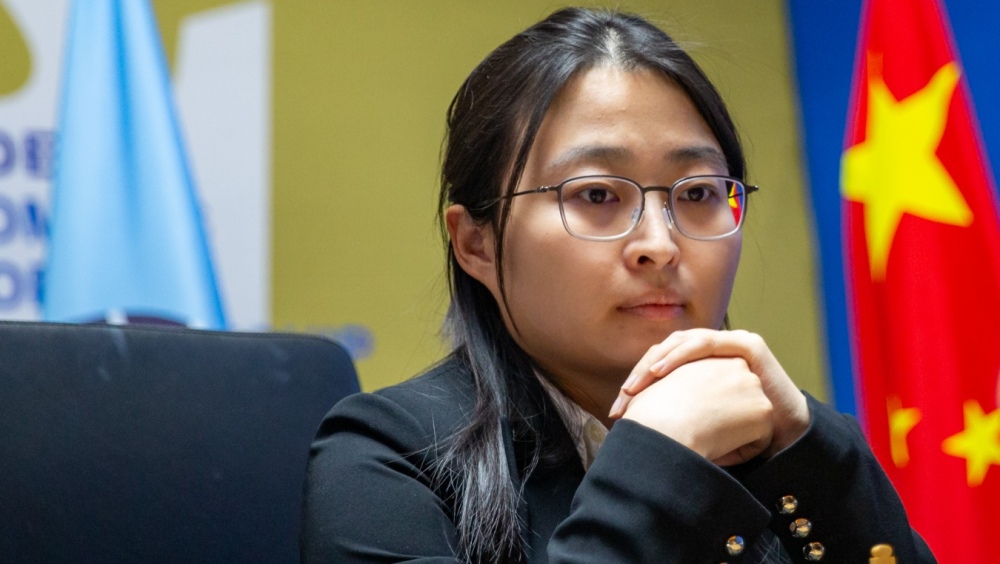
In the final game of the FIDE Women’s World Championship Match, tension could be felt in the playing hall. Tan Zhongyi entered the game with nothing to lose, while Ju Wenjun carried the pressure of needing only half a point to secure her fifth world title. The stakes couldn’t have been higher. Draws have been a rarity throughout the match, with six out of the eight previous games producing decisive results. That made the outlook for today’s game particularly intriguing. Would Ju play solidly to secure the draw she needed, or would we witness another fighting battle? Though the score may suggest a dominant performance from Ju Wenjun, the reality is far more nuanced. Tan Zhongyi fought hard throughout the match, often holding promising positions, and never allowing Ju an easy ride. Despite being down, she entered the final game hoping to create imbalance and generate winning chances. But Ju, calm and focused, played with clarity and precision, guiding the game to the draw she needed. The final game opened with the Sicilian Rossolimo—revisiting the line from Game 6 where Tan, with the black pieces, obtained a slight edge. This time, Ju deviated with 5.Re1 instead of 5.d4, and the players soon found themselves navigating a fresh and dynamic position. White accepted an isolated queen’s pawn, which Ju temporarily sacrificed before regaining it after a series of trades. 18.Rad1 e5 19. Bxd4 exd4 20. Qb4 a5 21. Qxd4 Qxd4 22. Rxd4 Although Ju was behind on the clock by 30 minutes, the evaluation bar was firmly rooted in 0.0, with a simple and open position. Following further exchanges, the game transitioned into a rook endgame, and by move 38, repetition confirmed the result: a draw. Despite the absence of fireworks in the final game, the match as a whole was anything but dull. The final score might mislead the casual observer into thinking Ju Wenjun steamrolled her way to victory, but the reality was more complex. Every game was filled with tension, and no outcome was certain until the final moments. Take, for instance, Game 2, which appeared dead equal until a sharp collapse under time pressure: 40…Ke8?? (instead of 40…b4!)Ju Wenjun, playing Black, faltered at the critical moment, allowing Tan Zhongyi to seize her opportunity and score her first win. This pattern repeated in every single game – both players lay in wait like pythons beneath the sand, ready to strike the moment their opponent slipped. Or Game 6, where Tan, pushing too ambitiously, lost the thread: Instead of maintaining balance with quiet play, Tan pushed 31.h4? a move that allowed Ju to break through with 31…g4. The momentum shifted entirely, and Ju converted her advantage with surgical precision. These examples are not isolated. Nearly every game in the match followed this pattern of high tension, mutual pressure, and a readiness to capitalize on the opponent’s mistakes. In the final post-game press conference, Ju and Tan expressed that their favorite games were games 8 and 7 respectively because of the quality of play. The Women’s World Championship Match has shown us an admirable display of not only skill – but immense fighting spirit from both sides. And fighting spirit is, after all, a key ingredient for any great chess player. With this draw, Ju Wenjun secures her place in history. She is now a five-time Women’s World Champion—a new record among Chinese players. Her legacy, built on years of consistent excellence and determination, will inspire generations to come. FACT SHEET, Game 9, FIDE Women’s World Championship 2025: White: Ju WenjunBlack: Tan ZhongyiResult: ½ Opening: Sicilian Rossolimo Game length: 38 movesMatch score: 6.5-2 (in favour of Ju Wenjun) Follow FIDE’s social media channels for updates, tune into YouTube for live commentary and coverage, and visit the official match website for more information. Written by Charlize van Zyl Photos: Anna Shtourman Official website: womenworldchampionship2025.fide.com/
Chess for Freedom Continental Championship and Workshop for Africa: Last call to register
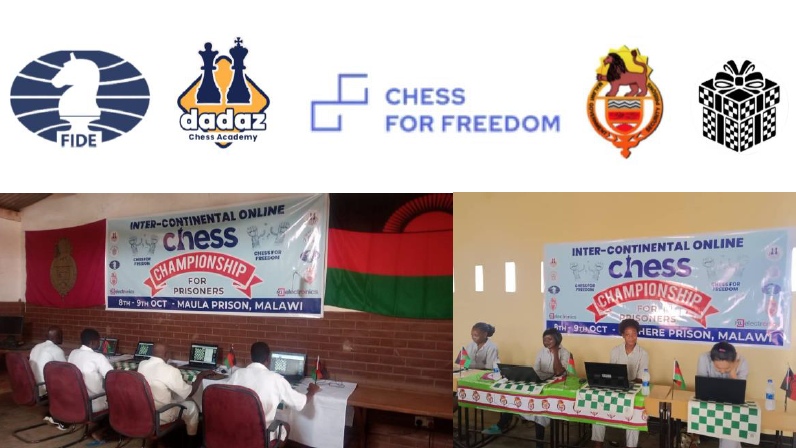
The 2025 Chess for Freedom Continental Chess Championship for Africa and Workshop organized by FIDE in collaboration with The Gift of Chess, Dadaz Chess Academy, and the Malawi Prison Service (Lilongwe, Malawi) are scheduled to take place from May 12 – May 14, 2025, in Lilongwe, Malawi. This will be the first in-person Chess for Freedom Conference for Africa. The registration deadline is May 1, 2025. We are very grateful for our partners, Malawi Prison Department and all the participating correctional facilities around Africa. Invitations are extended to all previous online intercontinental event participants from Africa and those who aspire to start the chess in prison program. The event is open only for representatives of Africa. Chess for Freedom – Workshop Goals To debrief on the outcomes from past online intercontinental chess events, hosted by FIDE and the Cook County Sheriff’s Office, including highlighting notable event accomplishments from Africa, and identifying improvement areas. To introduce the Chess for Freedom program to new African countries and support them with information to be part of the program and share its impact in other countries. To discuss engagement strategies for potential partners associated with the Chess for Freedom program. To have an Africa Continental Championship. The Workshop event schedule is as follows: May 11: Guests arrival. Welcome dinner May 12: Workshop featuring various breakout topics. May 13: Maula Prison tour – men and Juveniles (includes meeting with Prison administration and staff). Continental Championship for Africa on-line tournament May 14: Trip to Malawi Lake. Guests departure. “The prison officials see that in the places where the chess program is implemented, the behavior of the individuals in-custody changes, depression and stress levels decrease, they are better with socialization skills when they leave the facility. It’s not only about the skills and another way of spending free time, but also the sense of belonging to a community, to the chess family. We’ve been working a lot to advocate for a program itself, but the examples of the other countries work even better,” says Deputy Chair of the FIDE Management Board Dana Reizniece-Ozola about the rapid growth of the program all over the world. Chess for Freedom Workshop – Lodging Details The official hotel for the Chess for Freedom Workshop is the Lifestyle Boutique Hotel by Umodzi Park, Lilongwe in Malawi. All attendees are required to register for the workshop by signing up HERE. The Workshop program will include: Welcome from the Ministry of Homeland Security of Malawi Presentation by the FIDE – Dana Ozola Reizniece or Andre Vogtlin Chess for Freedom program overview – Mikhail Korenmann Chess for Freedom program in Malawi with the Gift of Chess support in Africa – Susan Namangale Chess Impact for young offenders in Ghana – David Amcheapong Nation-wide Chess for Freedom program in Kenya – PS Salome Beacco/Phyllis Ngingi Round-table discussion include prison authorities and participants of the Chess for Freedom project. Chess for Freedom Workshop – Contact Information Susan Namangale Dadaz Chess Founder / Gift of Chess Ambassador FIDE Schools Instructor and Member of FIDE PDC Commission.E-mail dadazchess22@gmail.com WhatsApp: +265999951477 Rafiq Namangale Chief Operations OfficerFIDE Developmental Instructor /Dadaz Chess CoachE-mail rafiqjames03@gmail.com WhatsApp: +265993701492

